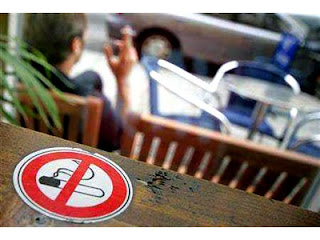
For the first time, the federal government will directly attack the nation’s tobacco addiction with a series of advertisements highlighting the grisly toll of smoking, a campaign that federal health officials hope will renew the stalled decline in the share of
Americans who smoke.
The government’s investment in the campaign is relatively modest: $54 million this year. The tobacco industry spends that much and more, on average, in just two days of promotional efforts. California has spent about $20 million annually since 2000 on anti-tobacco advertising, while New York spent about $10 million annually between 2003 and 2009. Other states also finance such ads.
But the effort by the Centers for Disease Control and Prevention is the first in which such advertisements will be played throughout the country. Dr. Thomas R. Frieden, the C.D.C.’s director, said the campaign would save lives and money.
“We estimate that this campaign will help about 50,000 smokers to quit smoking,” Dr. Frieden said Wednesday in an interview. “And that will translate not only into thousands who will not die from smoking but it will pay for itself in a few years in reduced health costs.”
The advertisements, which will appear on television and in newspapers starting Monday, show former smokers discussing the terrible health consequences of their habits.
In one TV ad, Terrie, 51, of North Carolina, who has a hole in her neck and barely any hair on her head after suffering head and neck cancer, tells the camera, “I want to give you some tips about getting ready in the morning.” She then pops in a set of false teeth, dons a blond wig and inserts a small speaker into the tracheotomy in her neck. She ties on a scarf to hide the device and says, “And now you’re ready for the day.” An announcer says: “You can quit. For free help, call 1-800-QUIT-NOW .”
Studies have shown that such graphic advertisements are effective in persuading smokers to quit, but they have also often led to opposition from smokers, who call them alarming and demeaning, and to efforts by the industry to end financing for the ads.
David Howard, a spokesman for the R. J. Reynolds Tobacco Company, which makes Camel and Pall Mall cigarettes, declined to comment directly on the advertising campaign because he had not seen it.
“We believe that adult tobacco consumers should be provided with accurate information about the risks associated with tobacco use,” he said. R. J. Reynolds is part of a group of tobacco makers that have sued the Food and Drug Administration to overturn rules that would require cigarette companies to cover much of their packaging with graphic warning labels. Two weeks ago, a federal judge in Washington declared the rules an unconstitutional violation of the companies’ free speech rights. The government is appealing.
Mr. Howard said that he doubted that tobacco companies would raise similar objections to the C.D.C. advertising campaign since it would not involve “taking our packaging to deliver anti-tobacco information.”
Dr. John Seffrin, chief executive of the American Cancer Society, said that cancer mortality rates are dropping faster than ever in the United States, and that the reduction in the proportion of Americans who smoke is one of the main reasons. He noted that a third of all cancers are directly attributable to smoking, and that many smoking-related cancers are unusually deadly and expensive to treat.
“If this ad campaign helps people quit and prevents some from starting, it’s the right thing to do,” he said.
Along with vaccinations, few public health efforts have the capacity to save as many lives as those that combat smoking.
Smoking remains the leading cause of preventable death and disease in the United States, killing more than 443,000 Americans each year, according to federal estimates. More than eight million Americans live with a smoking-related disease.
The C.D.C. ads will emphasize that smoking causes immediate damage to the body, and feature three former smokers providing tips about how they successfully quit.
“I’ve been waiting for the government to do this for 40 years,” said Matthew L. Myers, president of the Campaign for Tobacco-Free Kids. “Even in the tightest budget times, this is absolutely the right thing to do.”




















